A Global Figure And Spokesman For Peace, Justice
By Brian E. Muhammad -Contributing Writer- | Last updated: Jun 7, 2016 - 11:39:20 PMWhat's your opinion on this article?
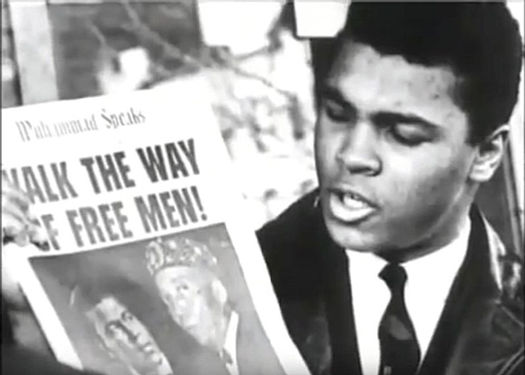
Muhammad Ali holds ‘Muhammad Speaks’ newspaper. Photo: Youtube.com
|
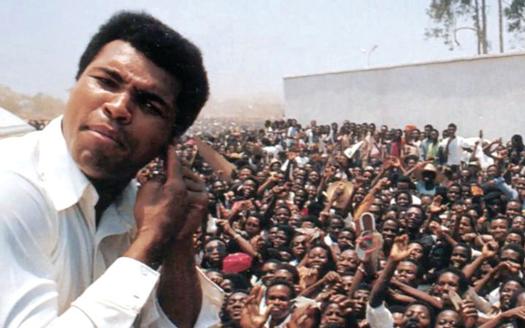
Crowd gathers in Kinshasa, Zaire, to cheer Muhammad Ali. Photo: PBS.org
|
Muhammad Ali is being celebrated from his home town of Louisville, Kentucky to the blue waters of the Nile River in Cairo, Egypt.
Reflections on his life and legacy have been constant and many since the renowned figure died on June 3 in a Scottsdale, Ariz., hospital.
“We say from Allah we come and to Allah we return,” said Abdul Akbar Muhammad, the international representative of the Nation of Islam, reciting the Holy Qur’an—the scripture of Muslims.
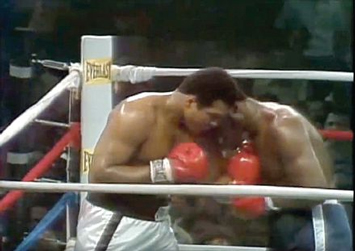
The epic “Thrilla in Mannila” vs. Joe Frazier in 1975
|
“Allah ordains life and death,” he added. “Now that Ali is gone we can look back on his unbelievable life.”
Muhammad Ali entered the sports world at a time when Black athletes were given an expected and assigned place to only perform and not get involved in social justice and issues of the world around them.
It’s undeniable boxer Ali had superior skills in that arena, but it was his tenacity of heart outside the ring that made him a truly global figure.
He became a force and a phenomenon that shook and rattled the status quo—from joining the Nation of Islam and becoming a Muslim minister to refusing to go to war in Asia and connecting with darker people all around the globe.
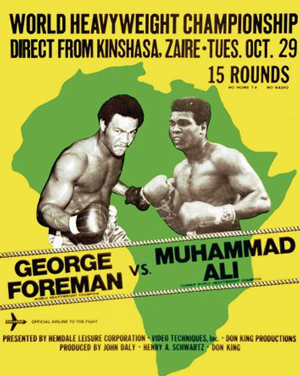
Poster for “Rumble in the Jungle”, 1974
|
After beating Sonny Liston in 1964 for the heavyweight championship belt as underdog Cassius Marcellus Clay, he declared himself a Muslim and follower of the Hon. Elijah Muhammad. Weeks later he announced that he had been given the name Muhammad Ali by his teacher.
When the leader of the Nation of Islam bestowed the “holy name” on his young follower, it made the champion a worldwide figure.
The name alone propelled Ali onto the international stage from Africa to the Middle and Far East, the Caribbean, Central and South America and Europe. As Muhammad Ali, he was a champion for the darker peoples of the earth. As a speaker, he would condemn White supremacy, colonialism and speak for the liberation of nations under the boot of America and Western nations. His struggles against the U.S. government and bold condemnation of imperialism resonated with Africa, Asia and oppressed people all over the world. In May 1964, Mr. Ali made his first trip to Africa where he went to Egypt, Nigeria and Ghana. In Egypt he was received by then President Gamal Abdel Nasser who gifted Ali with a miniature solid gold mosque to be given to the Honorable Elijah Muhammad. He had an audience with Ghanaian President Kwame Nkrumah.
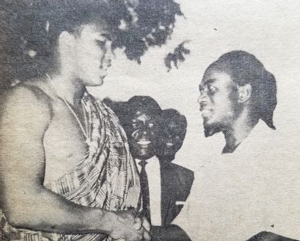
Ghana President Kwame Nkrumah greets Muhammad Ali
|
Mr. Ali was loved in the Muslim and Arab world, said Arab Journal publisher and writer Ali Baghdadi. He met Muhammad Ali in early 1967 as the battle with the American government over Vietnam was taking a toll.
“When I was the president of the Arab students … I used to invite him a lot to talk to the Arab students … and professors as well,” said Mr. Baghdadi. Mr. Ali was impressive addressing those groups, he remarked.
“He was so much attached to his religion and to the Islamic culture. He took Islam very seriously, he loved it and also the Islamic world; the Arab world loved him a lot.”
Mr. Baghdadi said although the Arab world didn’t care much about boxing, “well this man made them care, he made them proud of being Muslims.”
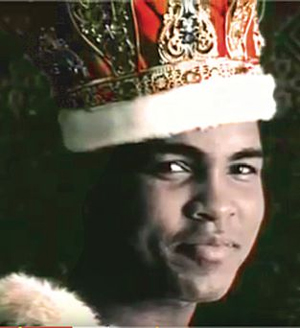
Muhammad Ali Photo: Youtube.com
|
“When I think of Muhammad Ali and his greatness; when I think of him being the people’s champion, I think of his fight outside of the ring,” said Jibril Hough an activist and community organizer told The Final Call.
“I value him because of his principled stand against the war in Vietnam … unjust wars in general …against killing innocent people and the willingness to sacrifice all that he had for what he believed in and also the willingness to stand alone,” Mr. Hough said.
Abdul Akbar Muhammad said standing against serving in the Vietnam War, Mr. Ali “saved thousands and thousands of lives across America” from fighting in a war that wasted an estimated 60,000 to 100,000 young Americans. Many young people reassessed the war in Vietnam and resisted going to war, he said.
Mr. Ali was among shining examples of authentic Black manhood for his unwavering position on Blackness and Islam, said Mr. Akbar Muhammad. Some see efforts underway to redefine Mr. Ali as a softer image of a “civil rights struggler,” he added. But Mr. Ali was involved in the “liberation” of his people, said Mr. Akbar Muhammad. “Ali is a witness of the men that the Honorable Elijah Muhammad produced,” he pointed out.
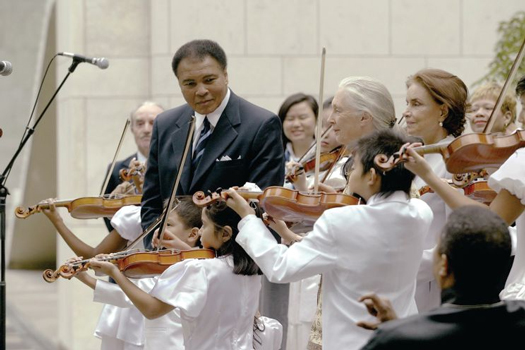
Muhammad Ali with musicians who played for him at the United Nations. Photo: UN Multimedia
|
Ali family spokesman Bob Gunnell announced in a press conference that along with sports journalist Bryant Gumbel, the comedian Billy Crystal and former President Bill Clinton would eulogize Mr. Ali. It’s the “unmanning” of the Black man, according to scholar and author Dr. Wesley Muhammad.
“All Black manhood that stood up in life; in death, they appropriate and then they domesticate,” Dr. Muhammad explained during a June 5 interview on the online Hereafter Is Now Network. If Black people fail to control the narrative of Muhammad Ali the automatic next step of the purveyors of White supremacy—which Mr. Ali fought against during the 1960s and beyond—is to water down his legacy and strength, he warned.
“We have to be fierce with the controlling of our narrative,” Dr. Muhammad said. “As long as we surrender to others the power over the writing of the narrative then we will always be the loser.”
Leaders from around the world lauded Muhammad Ali: President Barrack Obama said “he shook up the world, and the world’s better for it. Rest in peace, Champ.”
“All over the world people also flocked to hear him offer his view on the achievement of democracy and particularly equal rights when they were so strikingly missing in some of the richest countries of the world,” said Ireland President Michael Higgens, whose country Mr. Ali visited.
Kenya President Uhuru Kenyatta tweeted: “Muhammad Ali was not only a great boxer; I celebrate him as an inspiration and a peacemaker. He left footprints of true greatness on earth.”
Dr. Dlamini Zuma, chairperson of the African Union, wrote: “RIP Muhammad Ali, ‘The Greatest,’ Sincere condolences to his family, friends, fans, all over the world!”
Brazilian Soccer legend Pelé wrote on Instagram English and Portuguese: “The sporting universe has just suffered a big loss. Muhammad Ali was my friend, my idol, my hero.”
“He’ll be remembered as a man of the world who spoke his mind and wasn’t afraid to take a chance and went out of his way to be a kind, benevolent individual that really changed the world,” said Mr. Gunnell.
United Nations Secretary-General Ban Ki-moon June 4 extended his condolences on the passing of Muhammad Ali to the Ali family and millions of fans mourning his death in every corner of the world.
“Mr. Ali was far more than a legendary boxer; he was a world champion for equality and peace. With an incomparable combination of principle, charm, wit and grace, he fought for a better world and used his platform to help lift up humanity,” Mr. Ban said in a statement issued by his spokesperson.
Named a United Nations Messenger of Peace in 1998, Mr. Ali traveled the globe to support children and others caught up in conflict, and to promote reconciliation between people and nations, according to the world body.
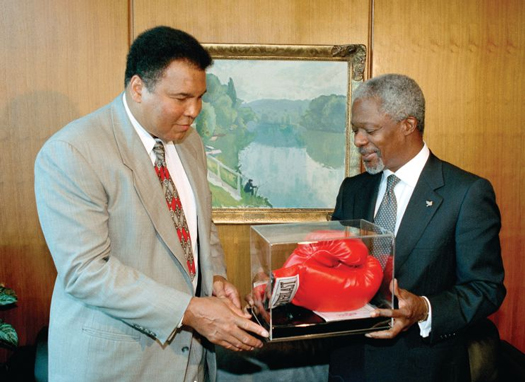
Former Secretary General Kofi Annan presents Muhammad Ali with an award in honor of him being named a “Messenger of Peace” in 1998. Photo: Eskinder Debebe/UN
|
“Well before taking on this role, he came to the United Nations in the 1970s to campaign against apartheid and racial injustice,” the UN added.
“The Secretary-General was honored to join Mr. Ali as a flag bearer at the opening of the 2012 Summer Olympic Games in London. He recalls Mr. Ali’s strength, humor and ability to bring people together,” the statement continued.
He was called “one of the past century’s great humanitarians and advocates for understanding and peace.”
Mr. Ali first came to the UN in 1978 to address the UN Special Committee against Apartheid with a message of peace and spirituality. He advocated for the developing world, supporting relief and development initiatives and hand-delivering food and medical supplies to hospitals, street children and orphanages in Africa and Asia, said the United Nations.
His work included a mission to Afghanistan aimed at raising awareness of the country’s needs and the UN’s work there. He met with heads of the World Food Program (WFP) and the UN Children’s Fund (UNICEF) as well as and representatives from the UN Assistance Mission in Afghanistan and the Afghan Administration, including President Hamid Karzai. His trip was being sponsored by UNICEF and WFP.
“I am a Muslim and there is nothing Islamic about killing innocent people in Paris, San Bernardino, or anywhere else in the world. True Muslims know that the ruthless violence of so called Islamic Jihadists goes against the very tenets of our religion,” said a statement issued by Mr. Ali last December.
“We as Muslims have to stand up to those who use Islam to advance their own personal agenda. They have alienated many from learning about Islam. True Muslims know or should know that it goes against our religion to try and force Islam on anybody. Speaking as someone who has never been accused of political correctness, I believe that our political leaders should use their position to bring understanding about the religion of Islam and clarify that these misguided murderers have perverted people’s views on what Islam really is,” he added.
The Muslim champion was responding to shootings in California, ISIS and negative comments about Muslims made by Republican presidential hopeful Donald Trump.
INSIDE STORIES AND REVIEWS
-
-
About Harriett ... and the Negro Hollywood Road Show
By Rabiah Muhammad, Guest Columnist » Full Story -
Skepticism greets Jay-Z, NFL talk of inspiring change
By Bryan 18X Crawford and Richard B. Muhammad The Final Call Newspaper @TheFinalCall » Full Story -
The painful problem of Black girls and suicide
By Charlene Muhammad -National Correspondent- » Full Story -
Exploitation of Innocence - Report: Perceptions, policies hurting Black girls
By Charlene Muhammad -National Correspondent- » Full Story -
Big Ballin: Big ideas fuel a father’s Big Baller Brand and brash business sense
By Bryan Crawford -Contributing Writer- » Full Story






 Click Here Stay Connected!
Click Here Stay Connected!








